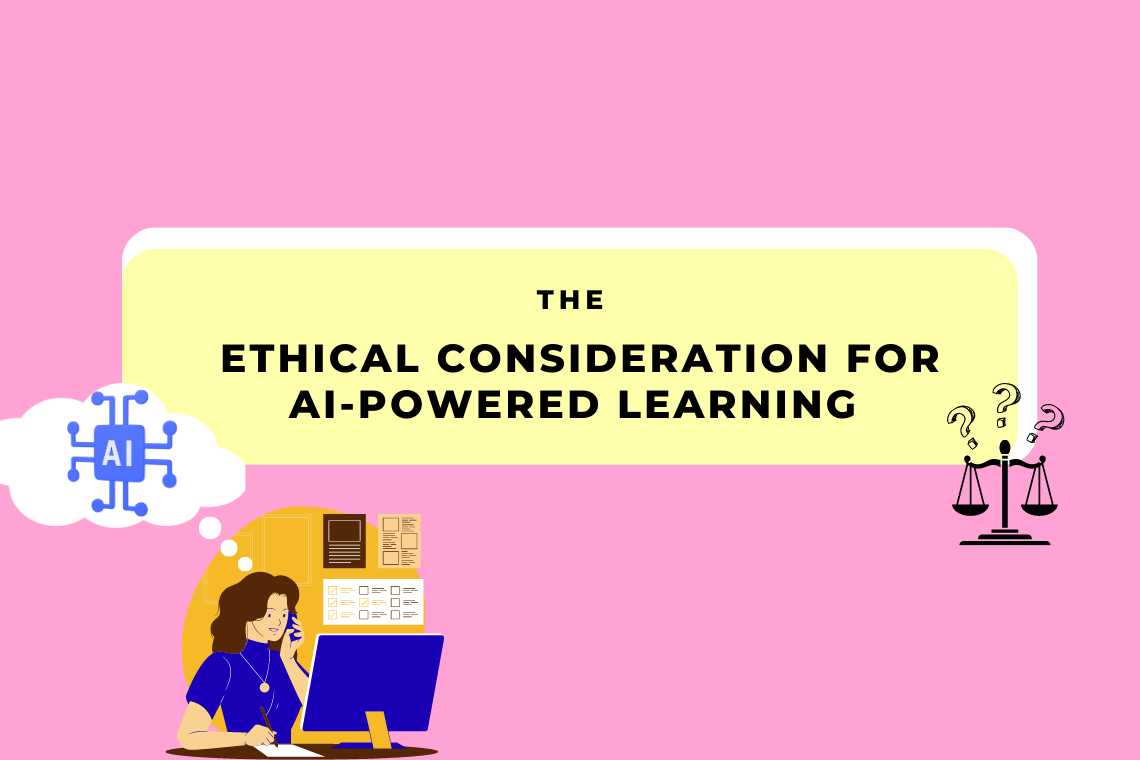AI-powered learning has become more of a trend during the past year. Its rise in popularity has driven many educational establishments to enter a common dilemma. Some tutors are still trying to navigate how to promote AI usage within a parameter that will benefit students. However, other tutors are hoping to shut down AI-powered learning altogether. The contrast in the perception of the benefits of AI usage has produced a plethora of questions. This blog will explore the ethical considerations behind using AI-powered learning in education.
These are a few of the pitfalls and peaks we must analyse when analysing the ethical considerations regarding AI usage in education.
1. Algorithm Bias
AI-powered learning is purely based on the sources from which it is provided to derive its statements. Depending on the sources the platform has been programmed to access, its responses will differ. Hence, it is difficult for AI-powered learning platforms to generate unbiased responses. The responses generated by the platform are likely to focus on a certain perception or view of the topic which may not align with the type or style of response that a student may prefer. Therefore, it is up to the user to differentiate between relevant sections to their questions. Algorithm bias can drive students to review and internalise incorrect information—especially if they do not have sufficiently knowledgeable about the topic. Consequently, they will not be able to question the validity of provided information.
2. AI Hallucination
The concept of AI hallucination may sound peculiar but it is of great interest. Any response generated by an AI chatbot usually seems like it is justified by strong arguments. What if I told you that is not the case? AI chatbots have been found to fabricate pieces, if not sections of information about certain topics. Depending on the prompts they receive, chatbots tend to take bits and pieces from various sources to generate responses. Due to the in-depth nature of the chatbot's responses, it is hard to validate the information provided in its answers. However, users should not be shied away from such a powerful tool, but rather should critically analyse the information- as you would with any other source.
3. Easy Accessibility
Interaction with your peers and tutors has shown to be essential to develop your interactive skills. However, in a world of technology, the structure of education has transformed over the years. Educators are promoting the usage of technological devices such as laptops and iPads to aid with task completion—even for children in primary schools! The use of online platforms has been observed to decrease the workload of teachers as they can easily communicate and set tasks for students with just the click of a button. Recently, AI-powered education has become a huge topic of discussion. The main attraction towards AI-powered learning seems to be the easy accessibility and efficiency of the platforms. It has been observed to have a fast response mechanism paired with a combination of simple and elaborate explanations for questions. AI-powered learning enables all students to have access to necessary feedback, explanation and sufficient time to ask their questions. Whereas in-person tutoring/classes usually impose time constraints on students. This is because tutors have time restrictions of up to 1 hour in which they engage with students and teach content. Also, not all students get adequate attention from teachers to ask their questions and clarify any doubts.
4. Teacher Role and the Value of their Input
Although AI-powered learning is efficient, constantly accessible and very swift with its responses it cannot replace teachers. AI platforms are very elaborate in the way they generate responses and the depth of explanation varies upon the level of understanding of students. However, AI is just an assistance tool when used in education. It is a perk of our new digital age to be able to solve all our questions and confusion with just one click. With this easy access comes its limits. The guidance provided by a tutor is crucial in the learning journey of a student. Tutor exposure is essential to set the foundation of the topics that are taught. An educator’s role in encouraging critical thinking, expressing empathy, and promoting creativity is vital for the learning journey of a student. Therefore, we must all remember that educators are the keystone of high-quality education and AI is merely an assistance accessory.
Conclusion
All the highlighted topics explore the ethical considerations including the perks and pitfalls of using AI-powered chatbots in education. The accessible and quick nature of AI platforms is an appealing feature. It enables tutors to reduce their workload whilst students can have constant assistance anytime anywhere. A platform that is efficient in tutoring assistance is Noodle Factory. The AI chatbot Walter used on the platform enables students to receive the guidance they require. The features of these types of platforms are endless and exciting to discover. Nonetheless, we must always remember that AI is merely used for assistance whilst educators will always be the curators!
If you would like to explore similar articles, have a look at: Risks of AI education.
